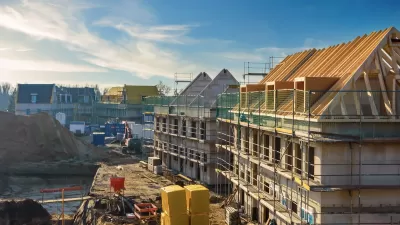Although it is widely seen as a national issue, decisions made at the local level often have a stronger impact on inflation than federal policies.

While it may be easy to blame the federal government for rising inflation, Alex Yablon, writing in Vox, argues that “many of the worst bottlenecks making the pandemic economic recovery so painful were put in place by political actors much lower down the food chain, from governors to city councilors to everyday citizens.”
“State and local jurisdictions, not the Fed or the feds, determine how much housing is built and where, when to permit cheap clean energy sources and vital energy transmission lines, and whether to expand ports and logistics infrastructure. Across the country, local legislators, executives, and public authorities have declined to spend more to improve economic capacity, or placed additional hurdles in the way of badly needed new development.”
Yablon outlines three areas where local governments have exacerbated the situation, as well as suggestions for how to reverse the negative impacts: energy and transportation, where local officials can support the transition to renewable energy; housing, where local decisionmaking about zoning and land use affect supply; and logistics infrastructure, which is often controversial at the local level. Too often, major infrastructure projects cross multiple jurisdictions and agencies with competing interests and priorities. As Yablon writes, “These efforts require a level of coordination and prioritization policymakers haven’t practiced in decades.”
FULL STORY: Mad about inflation? Blame your local officials.

Planetizen Federal Action Tracker
A weekly monitor of how Trump’s orders and actions are impacting planners and planning in America.

Canada vs. Kamala: Whose Liberal Housing Platform Comes Out on Top?
As Canada votes for a new Prime Minister, what can America learn from the leading liberal candidate of its neighbor to the north?

The Five Most-Changed American Cities
A ranking of population change, home values, and jobs highlights the nation’s most dynamic and most stagnant regions.

San Diego Adopts First Mobility Master Plan
The plan provides a comprehensive framework for making San Diego’s transportation network more multimodal, accessible, and sustainable.

Housing, Supportive Service Providers Brace for Federal Cuts
Organizations that provide housing assistance are tightening their purse strings and making plans for maintaining operations if federal funding dries up.

Op-Ed: Why an Effective Passenger Rail Network Needs Government Involvement
An outdated rail network that privileges freight won’t be fixed by privatizing Amtrak.
Urban Design for Planners 1: Software Tools
This six-course series explores essential urban design concepts using open source software and equips planners with the tools they need to participate fully in the urban design process.
Planning for Universal Design
Learn the tools for implementing Universal Design in planning regulations.
New York City School Construction Authority
Village of Glen Ellyn
Central Transportation Planning Staff/Boston Region MPO
Institute for Housing and Urban Development Studies (IHS)
City of Grandview
Harvard GSD Executive Education
Regional Transportation Commission of Southern Nevada
Toledo-Lucas County Plan Commissions





























